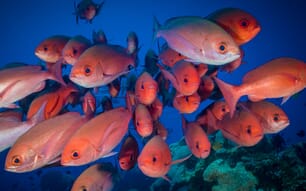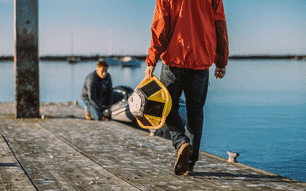The tags were found on beaches in Greenland and Ireland, thousands of kilometres from where they were first released in New Brunswick on wild Atlantic salmon last year.
Each year, ASF researchers surgically attach pop-off tags to selected salmon allowing them to track their movement from the river to feeding grounds in the ocean.
The tags measure light, depth and temperature to calculate a daily position for the fish. They store the data until a pre-determined date when they pop off and begin transmission. ASF researchers are using the data to pinpoint the reasons for high mortality at sea.
On May 10, 2014, ASF researchers tagged a 93 cm, 6.1 kilogram kelt in the Red Bank area on the Northwest Miramichi River in New Brunswick. A kelt is a salmon that spawned the fall before and is now on its way to sea to feed and build energy reserves before returning to spawn again. The fish was one of eleven tagged that year.
“The tagged fish descended the river and spent the next several months in the western Gulf of St. Lawrence before heading to the North Atlantic via the Strait of Belle Isle,” said ASF Biologist Graham Chafe.
“It wandered out to the edge of the continental shelf briefly before heading back somewhat closer to the coast of Labrador. At the northern tip of the province, it headed in a generally eastern direction to Greenland's western coast where it spent the month of September last year.
"The tag later popped off the fish as it was programmed to do and then transmitted its recorded data to us via ARGOS satellites. The fish was alive and well at the time of pop-off.”
For the next three weeks, ASF researchers were able to track the pop-off tag as it drifted out on the open sea between Greenland and Baffin Island, but the battery eventually died and transmission ceased. A few weeks ago, it was found on the shores of Greenland in Disko Bay and returned to ASF.
“It’s like finding a needle in a haystack because these tags are only a few inches long and quite light and narrow,” said Mr Chafe.
“The folks who spotted it noticed our contact information and kindly got in touch with us. While this tag did transmit most of its data, there is more to be downloaded from a retrieved tag than can possibly be accessed through transmissions from a small unit floating on the ocean.
"We'll gain even more information on the habits and habitats of this particular fish thanks to the people who found it now that it’s back home in New Brunswick.”
A second pop-off tag, also from a salmon tagged in 2014, was found on the shores of Ireland last month by a family travelling on holiday just north of the Shannon estuary. The family has been in contact with Mr Chafe via email and he is hoping to see that tag returned in the near future.
“I emailed him back to say the tag that he found was from 2014. I told him that it was placed on an adult salmon kelt from the Miramichi River in New Brunswick, Canada.
"That particular fish was a 79 cm, 3.97 kg female that we tagged on May 9, 2014. It swam downriver and out into the Gulf of St. Lawrence and eventually out into the North Atlantic. On August 22, 2014, the tag popped off because the fish died.
"Sometimes we can tell why a fish died such as due to a predator, but in this case we aren’t sure. The tag popped up and transmitted for about three weeks. After that, it floated about 3,000 kilometres where it was found by the family in Ireland.”
“This has been quite a year for finds,” said Mr Chafe. “We are so grateful to everyone who finds and returns our tracking equipment. Not only do we appreciate that they take the time to get in touch with us, but it completes the story for the wild Atlantic salmon that was being tracked.”




